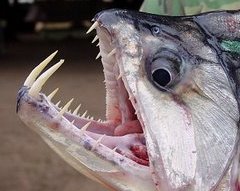“Dracula” fish lost its teeth about 50 million years ago
 London, March 11 : Scientists have used DNA analysis to suggest that the “Dracula” fish lost its teeth about 50 million years ago, and developed rows of sharp protrusions that resemble teeth.
London, March 11 : Scientists have used DNA analysis to suggest that the “Dracula” fish lost its teeth about 50 million years ago, and developed rows of sharp protrusions that resemble teeth.
Dubbed the “Dracula” fish, the creature is about 17mm (0.7 inches) long and has been found in only one Burmese stream.
According to a report by BBC News, the researchers, from London’s Natural History Museum (NHM), believe the fish lost its teeth over evolutionary time, but later evolved the bone fangs.
In their research, the team observed that though the males use the fangs to jostle each other, they do not appear to draw blood.
“When you watch them in captivity you can see the males sparring,” said NHM’s Ralf Britz. “They display with their lower jaws open incredibly widely, then they nudge each other; but we don’t see any wounds,” he added.
Dr Britz, who has worked with Burmese wildlife for more than a decade, named the species Danionella Dracula in honor of mythology’s most eminent fanged predator.
The tiny specimens came to the UK in a consignment of aquarium fish, and at first, the researchers mistook them for another related species.
“After a year or so in captivity, they started dying; and when I preserved them and looked at them under the microscope, I thought ‘my God, what is this, they can’t be teeth’,” Dr Britz told BBC News.
Rather than being true teeth, the fangs are made of bone.
“And when I looked in more detail, and stained the bone and cartilage with different colours and used an enzyme to dissolve away the muscle, I saw they clearly were not teeth,” said Dr Britz.
Instead, the jawbones appear to have developed rows of sharp protrusions resembling teeth and presumably serving the same purpose - plus, in the males, these extraordinary fangs.
Using DNA data to place the new species in its family tree, the researchers believe the lineage lost its teeth about 50 million years ago.
Compared to relatives, they appear to reach sexual maturity when their bodies have not fully developed.
The researchers believe the Dracula fish evolved to mature sexually before its body was fully developed, perhaps because individuals reproducing earlier in life had more reproductive success.
Given that these scientists, experienced with the family of fish, did not immediately spot D Dracula as a new species, they suggest it is entirely possible that the little fanged creatures are swimming round unrecognized in other aquaria even now. (ANI)